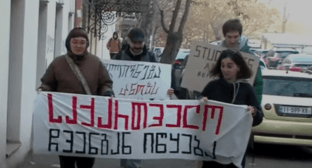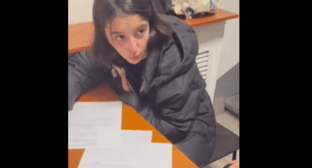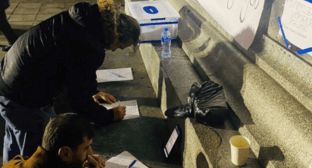01 April 2005, 15:02
Commissioner reports human rights violations in N Caucasus
On 31 March, the governmental newspaper Rossiiskaya Gazeta published the report of the Commissioner on Human Rights of the Russian Federation, Vladimir Lukin, for 2004 in which significant space is allocated to human rights violations in the Caucasus.
"The situation in the Chechen Republic continues to directly affect the state of affairs with human rights in Russia and the public climate in general. In spite of the government's seeking to implement gradual transition from the use of purely military to political methods of settlement and establish regular functioning of government and social institutions, the situation in Chechnya remains complex and strained. It is generally agreed that all parties to a conflict share responsibility for gross and mass violations of human rights. An essential element of the necessary and legitimate fight against terrorism is that it must exclude conditions promoting the "upbringing" of new and new terrorists," says the beginning of the second, main, chapter of the report.
"The question of settlement methods and Chechnya's future status is not the subject of the report of the Commissioner on Human Rights," says the Russian ombudsman. "It is clear, however, that neither the government, nor the Russian public as a whole can get by without new, untraditional vision of the problem and ways to solve it, including the use of global experience of crisis settlement. The current situation should not be oversimplified, reduced to the dilemma of whether or not to talk to the separatist leaders who have discredited themselves. Not only the unity and integrity of the Russian Federation should be the priority here, but also protection of the basic rights and liberties of citizens, both in the territory of the conflict and those suffering because of it outside this territory. In doing so, methods should be subordinate to the priorities."
"Within his mandate" Vladimir Lukin considers the "unsettled conflict in Chechnya first of all as a humanitarian problem with negative implications for entire Russia." He thinks "there is a need for specific and clear government actions aimed at providing security for all Russian citizens living in that region and, in particular, intercepting such mass and gross human rights violations as unauthorised arrests, abductions and murders. The way out of the "Chechnya trap" can only be provided by creating and strengthening civil society institutions and comprehensive observation of the fundamental human rights and liberties.
Noting an upsurge in terrorist activities in 2004 in Russia, the Commissioner writes, "The monstrous tragedy in Beslan again vividly demonstrated the need to search for effective methods to combat the "plague" of the new century, terrorism, which threatens the life and grossly violates the rights of Russian citizens. It is essential to realise that terrorists do not wage war on the Russian government, but on the huge, multi-ethnic nation and that they infringe on its basic, inalienable rights. Whatever the words or motives they use to disguise their criminal acts, they do not and cannot be justified. To fight terrorism, there is a need for the public, government, and law enforcement agencies to effectively join forces on the basis of voluntary, democratic cooperation. The government should provide protection of the citizenry from terrorism. However, the citizenry and public, on their part, should actively assist the government in accomplishing this super-difficult task, doing this freely and independently... Such personal involvement and personal responsibility are only possible in conditions of practical development of democratic institutions... Only democracy and actually ensured constitutional rights and liberties of the citizenry are the most important prerequisites to meet the terrorist threat."
The part of the report devoted to problems of ethnic and religious hatred in particular says there is an "exacerbation of nationalistic (including against ethnic Russians) manifestations on the part of activists of some ethnicities, ...including in the North Caucasus."
The "problem of Meskhetian Turks, in particular those living in the Krasnodar territory," is believed "specific for Russia" by the ombudsman. "By the moment the USSR broke up," remarks Vladimir Lukin, "many of these persons were legally resident in the Russian Federation which automatically made them Russian citizens. However, they have not received a status of citizens of the Russian Federation, chiefly because of the inattention of the federal centre and unlawful actions of the territorial (Krasnodar) government. As a result, many of them have faced the need to move to the US. Georgia as the historic homeland of Meskhetian Turks, in spite of its international commitments (including as a condition of its joining the Council of Europe), cannot or does not want to provide them with an opportunity to come back as yet. However, this fact does not relieve Russia of responsibility for fair and humane settlement of the issue of legal status of Meskhetian Turks. Inability or unwillingness to protect the rights of a relatively small ethnic group is damaging to Russia's international prestige."
The second chapter is concluded by the section titled Rights of Foreigners and Stateless Persons in Russia. The report mentions that "labour migration processes are in many cases accompanied by illegal employment of foreigners in Russia, which is not only coupled with problems for the state, but also with violation of their own labour and social rights." In the opinion of Vladimir Lukin, "large-scale immigration and illegal residence" of foreign citizens and stateless persons "exerts an increasingly significant influence on the home policy situation in Russia," creates a strained criminogenic and social situation (especially in border areas), "fails to meet the geopolitical interests of the Russian Federation and thus presents a serious threat to its security." "All this creates additional serious preconditions for violation of the rights of both Russian citizens and illegal migrants," thinks Lukin. "Population-forming processes in border areas should not be controlled by means of tougher instructions and sanctions, but through creating a positive, primarily economic motivation for migrants willing to work honestly to move to those regions where they are needed," concludes the Commissioner.
More about North Caucasus:
Author: Vyacheslav Feraposhkin, CK correspondent




